-

新人教版高中英语必修3Unit 5 The Value of Money- Discovering Useful Structure教学设计
Step 3 Meaning1. 过去将来时表示从过去某一时间来看将要发生的动作或存在的状态, 常用在宾语从句中。一般由“would/should +动词原形”构成。She hoped that they would meet again someday. 她希望将来有一天他们能再见面。2. was/were going to+动词原形: 表示过去将要发生或很有可能发生的动作, 常用于口语中, 表示预言、意图或者打算等。He was going to start work the following week. 他打算下星期开始工作。3. was/were about to do: 常用来表示即将发生的动作, “刚要/正要做……”。注意该结构不与任何时间状语连用。I felt that something terrible was about to happen. 我感到某种可怕的事情即将发生。4.was/were to do: 表示“曾计划做某事”, 如果表示“本来计划做某事, 动作没实现”, 则需用 “was/were to have done”。She said she was to have told me about the accident. 她说她本来想告诉我关于事故的事。5.Start, go, come, leave, see, meet等动词的过去进行时: 表示就过去某一时刻而言即将发生的动作。She was coming later. 她随后就来。I had just put on my overcoat and was leaving to visit a friend of mine. 我刚穿上外套要去看我的一个朋友。

新人教版高中英语必修3Unit 5 The Value of Money-Listening &Speaking&Talking教学设计
4. A:We’d like to have someone to say a word at the beginning to welcome the group.B:↙Who?A:We thought that you or Dr.Johnson might do it.B用降调说Who,其意思是问,对方想让谁在开场时致欢迎词。Step 6 Pronunciation---Practice1. Listen to the short conversation and mark the intonation with ↗, ↙ or ↙, ↗. Then discuss with a partner what they intend to convey by using different intonation.Owner: You know what ?↗ It’s a million-pound bank note↙.Waiter 1: Really ?↗(question)Waiter 2: Really !↙(unbelievable and surprised)Waiter 3: Really ?!↙↗(first question then surprised)2. Listen to the conversations. Underline the parts that are stressed and mark the intonation. Then talk about the implied meanings of the responses with different intonations. Listen again and repeat.1) Henry: It’s a nice suit.Owner: Oh, it’s perfect!↙(The intonation means it is very suitable for Henry.)2) Henry: Well, that’s very kind of you.Owner: Kind, sir ?↗(what you said is not right) No, it’s kind of you. You must come whenever you want and have whatever you like. Just having you sit here is a great honour !!↙(welcome you to come again)3)Henry:Well, to be honest, I have none. Oliver:(happily) What luck!(excited) Brother↗, what luck!↙(It means “Didn’t you hear it?”)Henry: Well, it may seem lucky to you but not to me!↗(angry) If this is your idea of some kind of joke, I don’t think it’s very funny. Now if you’ll excuse me, I ought to be on my way.↙(If so, I would leave.)Roderick: Please don’t go↙...(hope Henry can wait for a moment)Part B Viewing and Talking---Describe people’s changing attitudes in a film clipStep 1 Before-listening---Tell the filmYou are going to watch part of the film The Million Pound Bank Note. Look at these photos and guess what happens in the film.

新人教版高中英语必修3Unit 5 The Value of Money-Listening &Speaking教学设计
Step 4: Listen again and decide if the following statements are true (T) or false (F).1 It was the first time Chen Liyan's story was reported. T口 F口2 Chen found 10,000 yuan in a small plastic bag in Taiyuan railway station口 F口3 Wang Zheng apologized to Chen because he couldn't offer her more money. T口 F口4 Chen took out a large loan to cure her daughter, T口 F口5 Wang set up a fundraising website for Chen's daughter after Chen told him about her situation. T口 F口Step 5:After listening, discuss the questions.1 What kind of person do you think Chen Liyan is?Chen Liyan is generous and honest because she returned a large sum of money to the owner.2 Did Chen return the money because she didn't need it?No. She returned the money because it was the right thing to do. Evidence for this is that she refused to accept the reward money because she felt that it had not been earned. 3 Is it common for people to do what Chen did?It depends on the culture. In some countries it is quite common to return money that has been found. In other countries, people believe "Finders are keepers!" 4 How did Wang Zheng feel about the return of his money?He must have been very happy and relieved to have gotten his money back. We know this because he thanked Chen repeatedly and even offered her a reward.5 Why did Ma Dongbao tell Wang about Chen's family?He must have had great sympathy for Chen and her daughter and wanted to help them.'We know this because he arranged help for them. 6 How did the news reporter feel about Chen's actions?The news reporter felt that it showed that money wasn't the most important thing in life. We know this because the reporter told us that this is what Chen believes. and then said, “that's a great attitude to take."

新人教版高中英语必修3Unit 5 The value of money-Reading and Thinking教学设计二
? Could you offer me some kind of work here?? I don’t want your charity, I just want an honest job.? Careless: I landed in Britain by accident.Step 7:Consolidation.? Find Henry? Roderick and Oliver were I .making a bet when they saw Henry, a poor young man. ? Know Henry? About a month ago, Henry was sailing and later he found himself carried out to sea by a strong wind. Fortunately, he 2.was spotted by a ship. And it was the ship that brought him to 3.England? Offer money to Henry ? Oliver and Roderick gave Henry a letter and told him that there was money in it. They 4.persuaded him to accept it, and made him 5.promise that it wouldn't be opened until 2 o'clock.Step 8:Language pointsa large amount of: a large quantity of; a great deal ofe.g. They bought a large amount of furniture before they moved their new house.make a bet: make an arrangement to risk money, etc. on an event of which the result is doubtful.e.g. We made a bet on the result of the match.permit sb to do something: allow somebody to do somethinge.g. My mother doesn’t permit me to ride in the street after it rained.by accident: as a result of chancee.g. I only found it by accident.stare at: look at somebody or something with the eyes wide open in a fixed gaze( in astonishment, wonder, fear, etc)to be honest: to tell you the truth; to be franke.g. To be honest, I don’t think we have a chance of winning.Step7 Homework:What do you think will happen to Henry? Will the bank-note help him or get him into trouble?

新人教版高中英语必修3Unit 5 The Value of Money-Reading and Thinking教学设计一
Everybody wants to get wealth.In today’s material world,making money or becoming wealthy symbolizes a person’s success and capability. Many people just make every effort, pay any price to attain greater wealth. With money,they can buy nice, large apartments in nice neighborhood. With money they can own luxurious cars. Wealth seems to bring all happiness in life.But is wealth the only road to happiness? Not really. There are many things in the world, which are beyond the means of money, such as friendship, love, health and knowledge. People are so preoccupied with struggling for money that they have no time or would not take the time to form or maintain friendship. What happiness can they feel living as lonely miserable creatures without love or friends in the world even if they accumulate tremendous wealth?In my opinion, people can’t do anything without money, but money is not everything. What money will bring you depends on your personal belief and goal in life. If you are kind enough to help others, especially the poor, money is a good thing to you. With it, you can do much more for the benefit of people and your country, and it will add to your own happiness. If you want money just for your own needs, you’ll never be satisfied or happy. In a word,you should have money spent for more people. Only then can money be the source of your happiness.Step 8 Homework4 students in a group, one acts Roderick, one Oliver, one servant and the fourth one acts Henry Adams, then listen to the tape, pay more attention to the difference between American English and British English in pronunciation, stress, tone.

新人教版高中英语选修2Unit 2 Bridging Cultures-Discovering useful structures教学设计
The grammar of this unit is designed to review noun clauses. Sentences that use nouns in a sentence are called noun clauses. Nominal clauses can act as subject, object, predicate, appositive and other components in compound sentences. According to the above-mentioned different grammatical functions, nominal clauses are divided into subject clause, object clause, predicate clause and appositive clause. In this unit, we will review the three kinds of nominal clauses. Appositive clauses are not required to be mastered in the optional compulsory stage, so they are not involved.1. Guide the students to judge the compound sentences and determine the composition of the clauses in the sentence.2. Instruct students to try to learn grammar by generalizing grammar rules, controlling written practice, and semi-open oral output.3. Inspire the students to systematize the function and usage of noun clause1.Instruct students to try to learn grammar by generalizing grammar rules, controlling written practice, and semi-open oral output.2.Inspire the students to systematize the function and usage of noun clauseStep1: The teacher ask studetns to find out more nominal clauses from the reading passage and udnerline the nominal clauses.

新人教版高中英语选修2Unit 3 Food and Culture-Reading and thinking教学设计
The discourse explores the link between food and culture from a foreign’s perspective and it records some authentic Chinese food and illustrates the cultural meaning, gerography features and historic tradition that the food reflects. It is aimed to lead students to understand and think about the connection between food and culture. While teaching, the teacher should instruct students to find out the writing order and the writer’s experieces and feelings towards Chinese food and culture.1.Guide the students to read the text, sort out the information and dig out the topic.2.Understand the cultural connotation, regional characteristics and historical tradition of Chinese cuisine3.Understand and explore the relationship between food and people's personality4.Guide the students to use the cohesive words in the text5.Lead students to accurately grasp the real meaning of the information and improve the overall understanding ability by understanding the implied meaning behind the text.1. Enable the Ss to understand the structure and the writing style of the passage well.2. Lead the Ss to understand and think further about the connection between food and geography and local character traits.Step1: Prediction before reading. Before you read, look at the title, and the picture. What do you think this article is about?keys:It is about various culture and cuisine about a place or some countries.

新人教版高中英语必修3Unit 1 Festivals and celebrations-Discovering Useful Structure教学设计
4.That was an experience that frightened everyone. →That was _____________________. 答案:1. taking 2. being discussed 3. in the reading room 4. a frightening experienceStep 6 The meaning and function of V-ing as the predicative动词-ing形式作表语,它通常位于系动词后面,用以说明主语“是什么”或“怎么样”一种表示主语的特质、特征和状态, 其作用相当于形容词; 另一种具体说明主语的内容, 即主语等同于表语, 两者可互换。The music they are playing sounds so exciting. 他们演奏的音乐听起来令人激动。The result is disappointing. 结果令人失望。Our job is playing all kinds of music. 我们的工作就是演奏各种音乐。Seeing is believing. 眼见为实。Step 7 Practice1. It is ________(amaze) that the boy is able to solve the problem so quickly.2. Buying a car is simply _______(waste) money. 3. Please stop making the noise—it’s getting ________(annoy). 4. complete the passage with the appropriate -ing form.La Tomatina is a festival that takes place in the Spanish town Bunol every August. I think many food festivals are __________ because people are just eating. however, this festival is _________ because people don't actually eat the tomatoes. Instead, they throw them at each other! the number of people ________ part in this tomato fight, can reach up to 20,000, and it is a very __________ fight that lasts for a whole hour. The _______ thing is how clean Bunol is after the tomatoes are washed away after the fight. this is because the juice form tomatoes is really good for making surfaces clean!答案:1. amazing 2. wasting 3. annoying4. boring interesting taking exciting amazing

新人教版高中英语必修3Unit 2 Morals and Virtues-Discovering Useful Structure教学设计
1. 表示时间。Hearing these stories, I’m skeptical about the place. = When I heard these stories. . . 2. 表示原因。Not knowing his address, I can’t send this book to him. = Because/Since/As I don’t know his address. . . 3. 表示结果。His father died, leaving him a lot of money. =. . . and left him a lot of money4. 表示条件。Going straight down the road, you will find the department store. = If you go straight down the road. . . 5. 表示让步。Being tired, they went on working. =Although they were tired. . . 6. 表示行为方式、伴随情况或补充说明。He lay on the grass, staring at the sky for a long time. =. . . and stared at the sky for a long time注意:非谓语动词作状语时, 如所提供的动词不能和句子中的主语保持一致, 动词-ing形式必须有自己的逻辑主语, 通常由名词或代词来担任, 这就是独立主格结构。The last bus having gone, we had to walk home. (having gone的逻辑主语是the last bus, 而不是we)Weather permitting, the football match will be played on Friday. (permitting的逻辑主语是time, 而不是the football match)Step 7 Practice1. ________(study) hard, you are sure to get first prize. 2. People use plastic in their daily life, _______(leave) large amounts of waste. 3. ________(work) hard at your lessons, you are to succeed. 4. The old man, ____________(work) abroad for twenty years, is on the way back to his motherland. 5. ______________(finish) his homework, he was playing on the playground. Answers: 1. Studying 2. leaving 3. Working 4.having worked 5. Having finishedStep 8 HomeworkFinish the homework on Page 22.

新人教版高中英语必修3Unit 3 Diverse Cultures-Reading and Thinking教学设计
Discuss these questions in groups.Q1: Have you ever been to a place that has a diverse culture ? What do you think about the culture diversity ?One culturally diverse place that I have been to is Harbin, the capital city of Heilongjiang Province. I went there last year with my family to see the Ice and Snow Festival, and I was amazed at how the culture as different to most other Chinese cities. There is a big Russian influence there, with beautiful Russian architecture and lots of interesting restaurants. I learnt that Harbin is called “the Oriental Moscow” and that many Russians settled there to help build the railway over 100 years ago.Q2: What are the benefits and challenges of cultural diversity ?The benefits: People are able to experience a wide variety of cultures, making their lives more interesting, and it can deepen the feelings for our national culture, it is also helpful for us to learn about other outstanding culture, which helps improve the ability to respect others. The challenges: People may have trouble communicating or understanding each other, and it may lead to disappearance of some civilizations and even make some people think “The western moon is rounder than his own.”Step 7 Post reading---RetellComplete the passage according to the text.Today, I arrived back in San Francisco, and it feels good (1) _____(be) back in the city again. The city succeeded in (2)_________ (rebuild) itself after the earthquake that (3)________ (occur) in 1906, and I stayed in the Mission District, enjoying some delicious noodles mixed with cultures. In the afternoon, I headed to a local museum (4)____ showed the historical changes in California. During the gold rush, many Chinese arrived, and some opened up shops and restaurants in Chinatown to earn a (5)_____ (live). Many others worked on (6)______ (farm), joined the gold rush, or went to build the railway that connected California to the east. The museum showed us (7)____ America was built by immigrants from (8)________ (difference) countries and cultures. In the evening, I went to Chinatown, and ate in a Cantonese restaurant that served food on (9)________(beauty) china plates. Tomorrow evening, I’m going to (10)__ jazz bar in the Richmond District. 答案:1. to be 2. rebuilding 3. occurred 4. that 5.living6. farms 7.how 8. different 9. beautiful 10. a
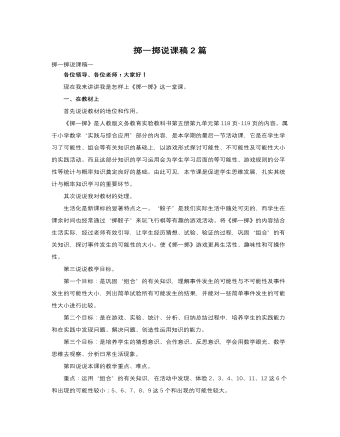
人教版新课标小学数学三年级上册掷一掷说课稿2篇
(1)猜想设疑。组织学生进行游戏实践,结果可能是选择和少的那队赢了。为什么选择和多的那队没胜,选择和少的那队却胜了呢?这里面又藏着什么奥秘呢?“猜想”是有方向的猜测和判断,是学生有效学习的良好准备。这里通过引导学生大胆猜测,由猜测结果与实际结果不同而引发学生的认知冲突,进而激发学生的求知欲,为后面的教学埋下了伏笔,从而很自然的过渡到下一个环节。(2)统计实验。这部分教学让全体学生参与获得知识的全过程,并在实验中与统计知识有机结合起来,提高了学生综合运用知识的能力。同时让全体学生参与实验统计,实验数据更加充分,实验结果与预测更加接近,从而达到实验目的。
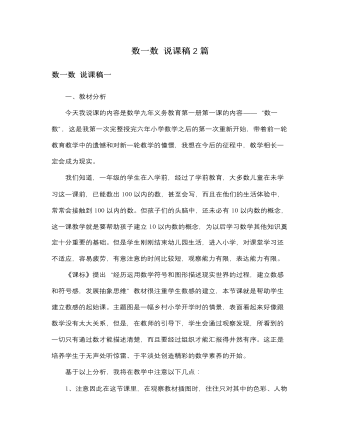
人教版新课标小学数学一年级上册数一数 说课稿2篇
为了进一步让学生掌握数数的规律,我把孩子们刚才数过的一些事物按照从小到大的顺序排列(多媒体课件),并要求学生再数一数,数完后再让他们读一读。这个环节的设计自始至终都让孩子自己去观察、动脑,主动参与到和他人的合作交流之中,在找、数和说的过程中探究新知,学会“一个一个地按顺序数数”。第三个环节:综合实践、学以致用。为了体现数学来于生活,用于生活的理念。首先,我出示了一些生活中孩子感兴趣的事物,要求孩子们正确地数出,并用数字来正确表述。此环节中,课件中所出示的图片与相应的数字一一对应,我让孩子们依次输出后,再指名同学用鼠标拖进正确的数字,孩子们觉得又新奇又好玩,纷纷要求上来试试,参与积极性非常之高。这是一个寓教于乐的环节,此环节中即让学生利用了和巩固新课中总结的新知识,又让学生在跃跃欲试的热情中感受到玩中学的乐趣。
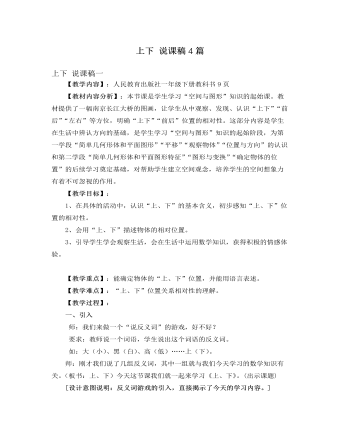
人教版新课标小学数学一年级下册上下 说课稿4篇
这一环节的设计,我运用直观和操作的方法,调动小学生耳、眼、口、手多种感官参与学习活动,并且互相配合使学生的大脑保持兴奋状态,有利于学生形成完整正确的方位要领。而且使分类与方位结合在一起,让学生在玩中逐步了解到一个数学知识不可能单一存在,在生活中处处都存在多种的数学知识。(三)练中生趣,以趣促练1、出示一副美丽的田野风光,看到这么美的场景,同学们可展开想象的翅膀,随意添上你想加的物体,并且运用学过的知识小组间互相说几句话。这时学生有的加上一轮红日,有的加有一轮明月,有的可能画上一朵小花……小组间展开了激烈的讨论,都可以准确的说出谁在谁的上面,谁在谁的下面等等这些相对位置的话。2、课件展示一所空着的4层楼房,请同学们拿出手中喜欢的动物图片贴在空房子里,互相说一说你第一层、第二层、第三层、第四层分别贴的是哪些小动物,用我们学过的知识再说一说谁住在最下面,是第几层,第二层住的是谁,它在谁的上面、谁的下面,第三层呢?
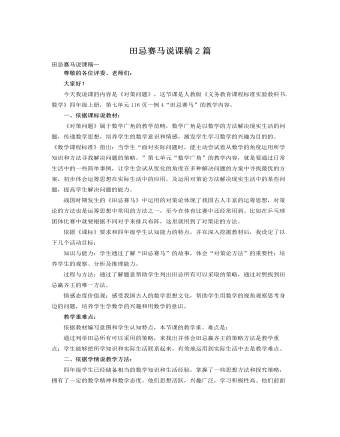
人教版新课标小学数学四年级上册田忌赛马说课稿2篇
(四)深入探究,重新审视对策问题解决问题不是学习的最终目的,让学生不断体验对策的价值才是关键所在。对策的价值在哪里?设计对策的关键是什么?把问题抛给学生去思考,一方面让学生再次感受正确对策达到“以小打大”、“以弱胜强”妙处,更重要的是让学生明确设计对策的关键前提是什么?即“知己知彼,百战不殆”的数学思想,以便根据对手的变化灵活运用对策。教学步骤设计:1、学生探讨,如果齐王的下等马都比田忌的上等马快,田忌还有获胜的可能吗?2、田忌赛马第二次获胜的前提是什么?(田忌猜测道齐王安排赛马的出场顺序还和第一次一样)3、如果齐王安排赛马的出场顺序改变了,田忌该怎样才能获得胜利?(找两位同学分角色演示一下)4、回忆课前时候,老师为什么会在纸牌游戏“比大小中”屡战屡胜。
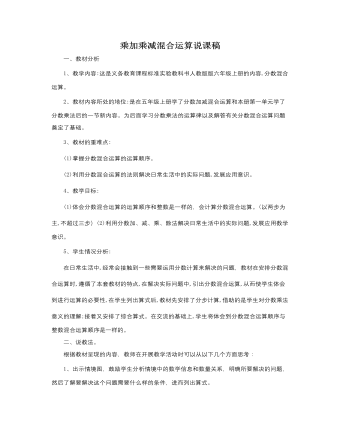
人教版新课标小学数学六年级上册乘加乘减混合运算说课稿
通过本节教学使学生学会运用直观的教学手段理解掌握新知识,学会有顺序的观察题、认真审题、正确计算、概括总结检查的学习习惯。四、教学程序一、复习1、说说每道题的运算顺序。2、问:在没有括号的算式里,如果有乘法又有加、减法,按怎样的顺序运算?在有括号的算式里,要按怎样的顺序运算?二、教学新课1、教学例2的第(1)题:说说这道题要先算哪一步再算哪一步?为什么要按照怎样的顺序运算?学生板演。2、教学例2的第(2)题。(1)说明:同样的,整数乘法的交换律、结合律对于分数乘法同样适用。(2)出示例2题(2):说说这道题例的数据有什么特点?这样算简便吗?为什么这样可以简便?应用了什么运算定律?按简便算法计算结果。3、练一练想先那些题可以用简便算法?指名板演。4、练习五2(做书上。第三题为什么可以用简便算法。)5、练习五后两题为什么这样算?三、巩固练习练习五1、3、5
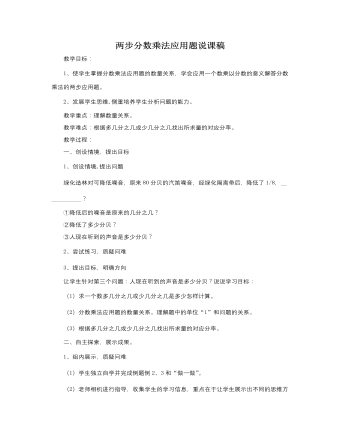
人教版新课标小学数学六年级上册两步分数乘法应用题说课稿
(三)看书质疑师:今天探索的问题与教科书第20-21页里例2-例3的内容相似,打开看看,书是怎么解答的?有疑问的可以提出来。生认真看书。生质疑。三、模拟练习,拓展应用师:请看学校调查表(课件出示),还有什么问题没有解决啊?(买折叠车和同学去秋游的人数)想解决吗?(想)师:提供这个信息能解决什么问题呢?生:买车的人数。师:你会直接口算吗?会的请你站起来告诉大家。生都站了起来了。师:这么都同学会啊,老师很为你们高兴,还是请代表说。生说。师:你们有意见吗?生:没有(好)师:谁能求出选择秋游的人数?生:不能啊,条件不充分师:那你能根据图意估计一下,然后补充一个条件,使我们能用今天的知识算出这些人数吗?
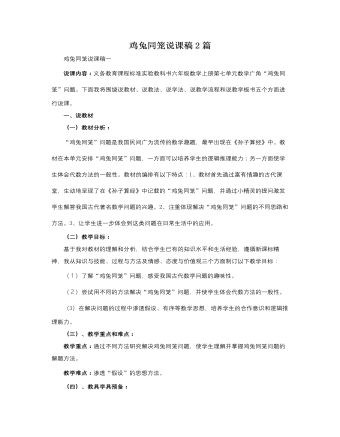
人教版新课标小学数学六年级上册鸡兔同笼说课稿2篇
2.交流讨论的结果:(老师根据学生的汇报板书)①假设都是鸡,则有8×2=16只脚,实际有26只脚多了26-16=10只脚.②一只鸡换成一只兔,就会多4-2=2只脚,所以笼子有10÷2=5只兔.③鸡就有8-5=3只.师:真是了不起,不用试也能求出鸡兔来,刚才我们是假使全是鸡,如果假使全是兔,会是怎样的情况呢?3.你还会用所学的方法解决吗?(引导学生用方程解答)4.我们已经能够用三种方法解答鸡兔同笼问题,到底对不对呢?怎样才能知道?———检验(板书)[设计意图:此环节是本课的重点,放手让学生合作探究,学生从体验、尝试到讨论、汇报,结合课件的直观演示,学生个人或集体的智慧在这里可以得到充分的展现。方程法、假设法对于大部分学生来说至少有一种方法是他自己会理解或掌握的,老师在学生汇报的过程中应机敏地倾听,机智地诱导,引导学生较为完整、准确地说明算理,特别是假设法算理,进而让全体学生在交流的过程中学会倾听、学会思考、学会解释、学会质疑,学会辩驳。]
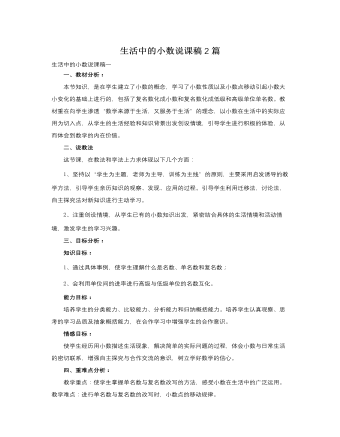
人教版新课标小学数学四年级下册生活中的小数说课稿2篇
一、教材分析:本节知识,是在学生建立了小数的概念,学习了小数性质以及小数点移动引起小数大小变化的基础上进行的,包括了复名数化成小数和复名数化成低级和高级单位单名数。教材重在向学生渗透“数学来源于生活,又服务于生活”的理念,以小数在生活中的实际应用为切入点,从学生的生活经验和知识背景出发创设情境,引导学生进行积极的体验,从而体会到数学的内在价值。二、说教法这节课,在教法和学法上力求体现以下几个方面:1、坚持以“学生为主题,老师为主导,训练为主线”的原则,主要采用启发诱导的教学方法,引导学生亲历知识的观察、发现、应用的过程。引导学生利用迁移法,讨论法,自主探究法对新知识进行主动学习。2、注重创设情境,从学生已有的小数知识出发,紧密结合具体的生活情境和活动情境,激发学生的学习兴趣。
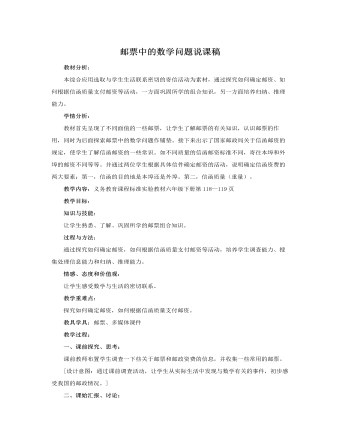
人教版新课标小学数学六年级下册邮票中的数学问题说课稿
(2)请你思考:师:这样就需要设计一张其他面值的邮票,如果最高的资费是6元,那么用3张邮票来支付时,面值对大的邮票是几元?可增加什么面值的邮票?(学生分组讨论设计思考)生:6元除以3元就是2元,可增加的邮票面值可为2.0元,2.4元或4.0元。(3)小结:虽然满足条件的邮票组合很多,但邮政部门在发行邮票时,还要从经济、合理等角度考虑。【设计意图:大胆放手,让学生参与数学活动。让学生成为课堂的主体,让他们在动手、动脑、动口的过程中学到知识和思维的方法,知识的获得和学习方法的形成都是在学生“做”的过程中形成的。】四、巩固深化:1、如果小明的爸爸要给小明回一封不足20g的信,他该贴多少钱的邮票?2、如果小明的好朋友要寄一封39g的信,他该贴多少钱的邮票?五、课后实践:课后给你的亲戚或者好朋友寄封信。
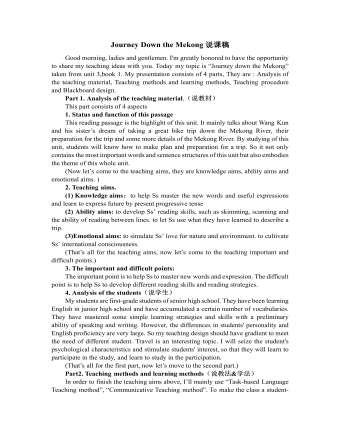
人教版高中英语必修1Journey Down the Mekong说课稿
2. let the Ss complete the forms paragraph by paragraph. Purpose here is to help Ss to get the habit of reading a passage as a whole, and pay attention to the organization of the text, as a result the Ss will fully understand the whole passage.3. ask Ss to retell the passage with the help of the key words in the form.Since the Ss in the class are in different levels, so I let them to fill in the blank to understand the meaning of the words and phrases better. ( That’s all for the while-reading. Now let’s move to the fifth step.)Step V: Post-reading (10mins) ---DiscussionIn this part students are asked to discuss in groups and list Wang Kun’s and Wang Wei’s attitudes about the trip. After that, Ss are encouraged to express their attitudes with the whole class. Collect their answers and don’t forget to praise them even if their answers may not be perfect.In this activity, discussion provides a vivid and active learning environment for Ss to communicate in English with newly learned language items. (Finally it comes to the homework.)StepⅥ: Homework (1min)1. Ss are required to read the text again after class and figure out the meaning of some complex sentences.2. Do the exercises on P19; This can help Ss to consolidate what they’ve learnt and make preparation for the next lessonPart4. Blackboard design.(说板书设计)On the top, there is the title of this lesson. On the left, there are main ideas for each paragraph. On the right, there are some new words and expressions.Unit 3 Travel journalJourney down the MekongMain idea of each para.:Para1: deciding to take a great bike trip along the Mekong river.Para2: Different attitudes between Wang kun and Wang wei.

